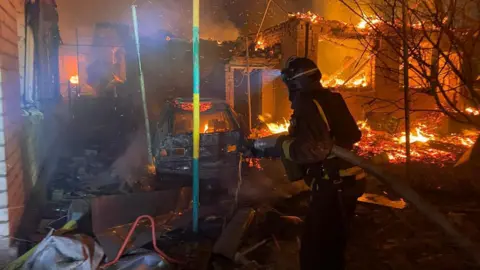In the wake of Israeli retaliatory strikes on Iran, the atmosphere in the nation has significantly shifted, characterized by a mix of anxiety and cautious optimism among its residents. On Saturday, Iranians reported a state of heightened tension, with many expressing their feelings of uncertainty regarding the future.
Soheil, a 37-year-old engineer residing in Isfahan, shared that conversations among his colleagues were dominated by discussions of the recent attacks. They expressed hope that the Israeli strikes, which reportedly targeted only military locations, might prevent escalation into a broader conflict. "It seems that people are hopeful that soon the situation will return to normal," he mentioned in a phone interview with The New York Times. However, he noted that "the vibe is not normal," with reactions ranging from worry to indifference, and in some cases, even contentment among those who believe the strikes might weaken the regime’s grip on power.
This sentiment is not unique to Soheil. Many Iranians, who also chose to remain anonymous to avoid any repercussions, echoed his mixed feelings about the situation. On the official front, Iranian authorities have attempted to downplay the ramifications of the attacks, describing them as limited in damage. State media reported that Iran's air defenses were effective, intercepting a significant portion of the strikes.
As the nation grapples with the aftermath of this military escalation, the dichotomy of feelings showcases a population that is resilient yet cautious, reflecting both fear of further military actions and a glimmer of hope for potential change amidst turmoil.
Soheil, a 37-year-old engineer residing in Isfahan, shared that conversations among his colleagues were dominated by discussions of the recent attacks. They expressed hope that the Israeli strikes, which reportedly targeted only military locations, might prevent escalation into a broader conflict. "It seems that people are hopeful that soon the situation will return to normal," he mentioned in a phone interview with The New York Times. However, he noted that "the vibe is not normal," with reactions ranging from worry to indifference, and in some cases, even contentment among those who believe the strikes might weaken the regime’s grip on power.
This sentiment is not unique to Soheil. Many Iranians, who also chose to remain anonymous to avoid any repercussions, echoed his mixed feelings about the situation. On the official front, Iranian authorities have attempted to downplay the ramifications of the attacks, describing them as limited in damage. State media reported that Iran's air defenses were effective, intercepting a significant portion of the strikes.
As the nation grapples with the aftermath of this military escalation, the dichotomy of feelings showcases a population that is resilient yet cautious, reflecting both fear of further military actions and a glimmer of hope for potential change amidst turmoil.




















